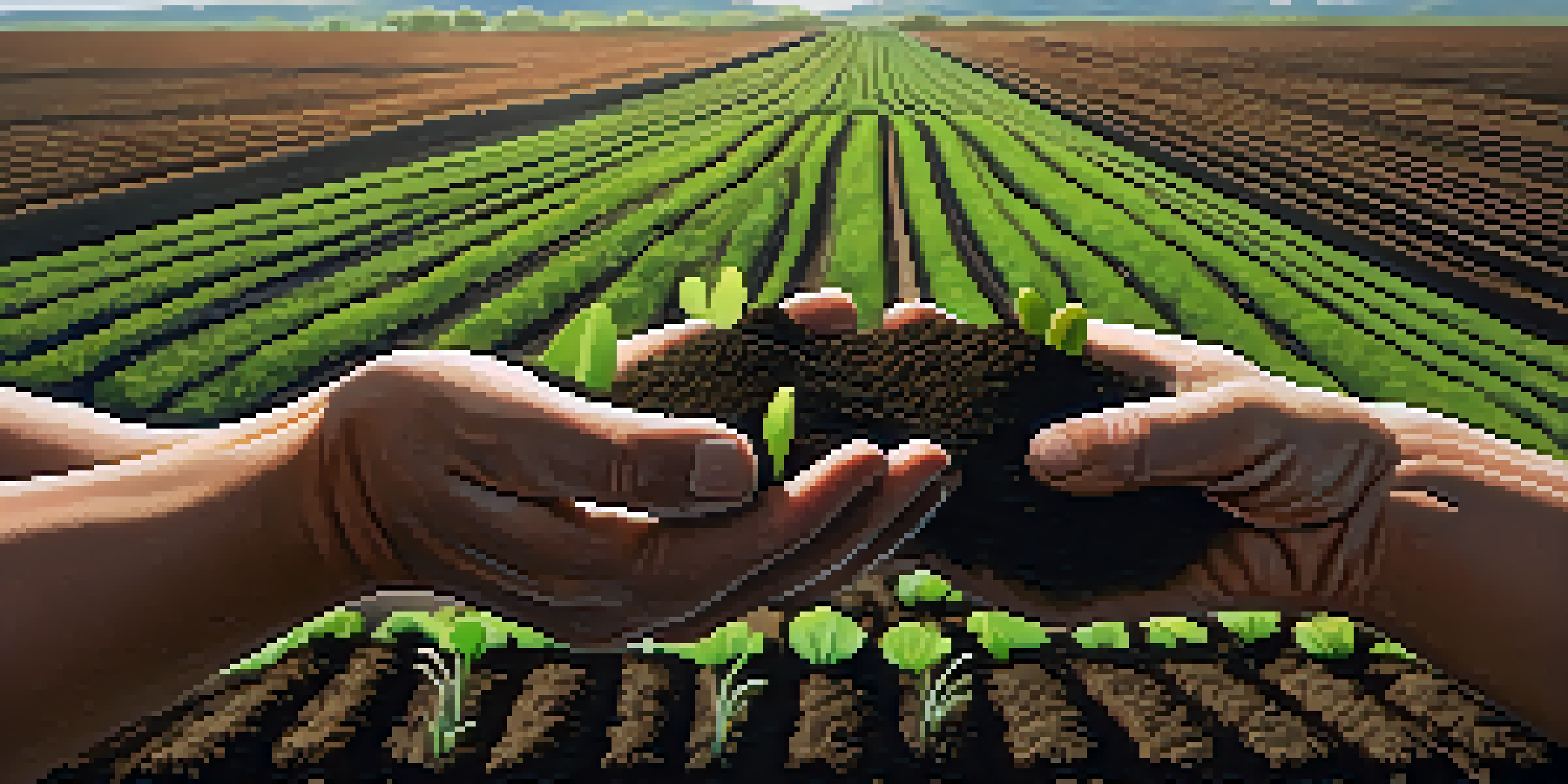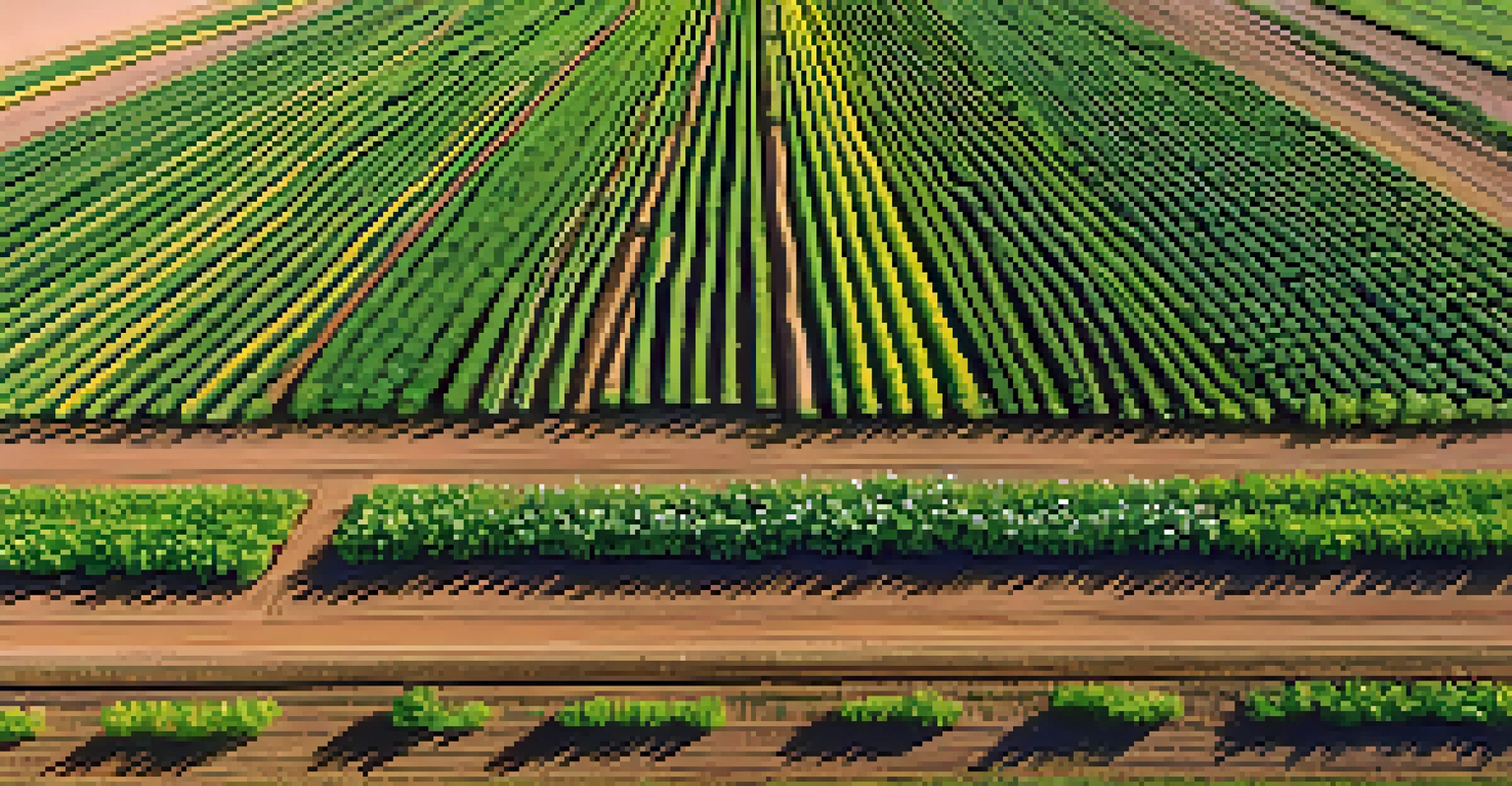Impact of Climate Change on Agriculture in Colorado: A Review

Understanding Climate Change and Its Effects
Climate change refers to long-term shifts in temperatures and weather patterns, primarily due to human activities. In Colorado, these changes are evident through rising temperatures and altered precipitation patterns. For farmers, this means adapting to a new reality where traditional farming practices may no longer be effective.
The climate crisis is not just a challenge for the future; it is a reality that farmers are facing today, impacting their livelihoods and the food we eat.
These shifts can lead to increased droughts and unpredictable rainfall, making it difficult for farmers to plan their planting and harvest schedules. Additionally, pests and diseases that thrive in warmer conditions may become more prevalent, threatening crops. Understanding these dynamics is crucial for developing effective strategies to mitigate their impact.
As we delve deeper into the specific effects on agriculture, it's essential to consider the diverse crops grown across the state. From wheat to corn and specialty crops, each of these has unique vulnerabilities and resilience to climate change, which will shape the future of farming in Colorado.
Drought: A Growing Concern for Farmers
Drought has become an increasingly common challenge for farmers in Colorado due to climate change. With rising temperatures leading to higher evaporation rates, the availability of water for irrigation is becoming scarce. This scarcity forces farmers to rethink their water usage and crop selection, often leading to difficult decisions.

For example, crops that require significant water, like alfalfa and certain fruits, may become less viable in arid conditions. Farmers might need to shift towards more drought-resistant varieties or alternative crops altogether. This transition not only impacts the economic viability of farms but also affects local food supply chains.
Climate Change Affects Farming
Farmers in Colorado must adapt to changing temperatures and precipitation patterns, which impact traditional farming practices.
Moreover, the psychological toll on farmers facing prolonged drought conditions cannot be overlooked. The stress of uncertain yields and financial instability can lead to burnout, further complicating the agricultural landscape.
Shifting Growing Seasons and Crop Viability
Climate change is causing noticeable shifts in growing seasons, impacting when farmers can plant and harvest their crops. In Colorado, warmer winters and earlier springs can lead to earlier planting times, which may sound beneficial but can create a host of issues. For instance, crops may be vulnerable to frost damage if planted too soon.
Farmers are on the front lines of climate change, and adapting our agricultural practices is key to ensuring food security for future generations.
This shift also raises questions about crop viability. A crop that once thrived in Colorado’s climate might struggle to adapt to the new conditions. This change necessitates ongoing education and research to ensure farmers are equipped with the knowledge needed to make informed decisions regarding crop selection.
Additionally, local agricultural extension services play a crucial role in helping farmers navigate these changes. By providing resources and support, they can help farmers adapt to shifting conditions and maintain productivity.
Pests and Diseases: New Threats to Crops
With climate change altering the landscape, pests and diseases are becoming a more significant threat to Colorado's agriculture. Warmer temperatures provide an ideal environment for pests to thrive, often leading to increased infestations. This situation forces farmers to invest more in pest management strategies, adding to their financial burden.
Moreover, diseases that were previously limited to certain regions may spread to Colorado, putting crops at risk. The introduction of these new threats requires farmers to stay vigilant and adapt quickly to changing circumstances. Integrated pest management strategies and resistant crop varieties are becoming essential tools in this battle.
Drought Challenges Crop Viability
Increasing drought conditions force farmers to reconsider water usage and select more resilient crop varieties.
Ultimately, addressing pest and disease challenges requires collaboration among farmers, researchers, and agricultural organizations. By sharing knowledge and resources, they can develop effective solutions to protect crops and ensure food security.
Economic Implications of Climate Change on Agriculture
The economic ramifications of climate change on agriculture in Colorado are profound. As farmers face challenges like drought and pest invasions, their yields may decline, leading to reduced income. This not only affects individual farmers but also has a ripple effect on local economies that rely on agricultural output.
Insurance costs may rise as risks increase, further straining farmers' finances. Additionally, consumers may see fluctuating prices for basic goods, which can lead to food insecurity in some communities. It's crucial for policymakers to recognize these economic impacts and consider support systems for affected farmers.
Investing in sustainable practices and technology can help mitigate these economic challenges. For example, precision agriculture and water-saving irrigation techniques can enhance productivity while conserving resources, ultimately benefiting both farmers and the economy.
Adapting Agricultural Practices for Sustainability
To combat the challenges posed by climate change, Colorado farmers are increasingly adopting sustainable agricultural practices. Techniques such as crop rotation, cover cropping, and conservation tillage can improve soil health and resilience. These practices not only help combat environmental issues but also enhance farm productivity over time.
Sustainable practices can also reduce dependency on chemical inputs, promoting biodiversity and creating a healthier ecosystem. For example, introducing beneficial insects can naturally control pest populations, reducing the need for pesticides. This holistic approach is not just beneficial for the environment; it also resonates with consumers seeking sustainably sourced products.
Sustainable Practices Are Key
Adopting sustainable agricultural methods can enhance resilience against climate change while benefiting the environment.
As farmers embrace these changes, collaboration becomes key. By sharing experiences and learning from one another, farmers can collectively strengthen their resilience against climate change.
The Role of Policy in Supporting Farmers
Policies play a crucial role in shaping how agriculture responds to climate change in Colorado. Government programs that provide financial assistance for adopting sustainable practices can greatly benefit farmers. These incentives can encourage the transition to more resilient farming methods, ensuring long-term viability.
Furthermore, research and development funding can help advance agricultural technologies aimed at mitigating the effects of climate change. By investing in innovative solutions, policymakers can empower farmers to tackle challenges more effectively. Engaging farmers in policy discussions also ensures their voices are heard, leading to more effective solutions.

Ultimately, a collaborative approach between farmers, policymakers, and researchers is essential for building a resilient agricultural sector. This partnership can pave the way for sustainable practices that benefit not only farmers but the entire community.